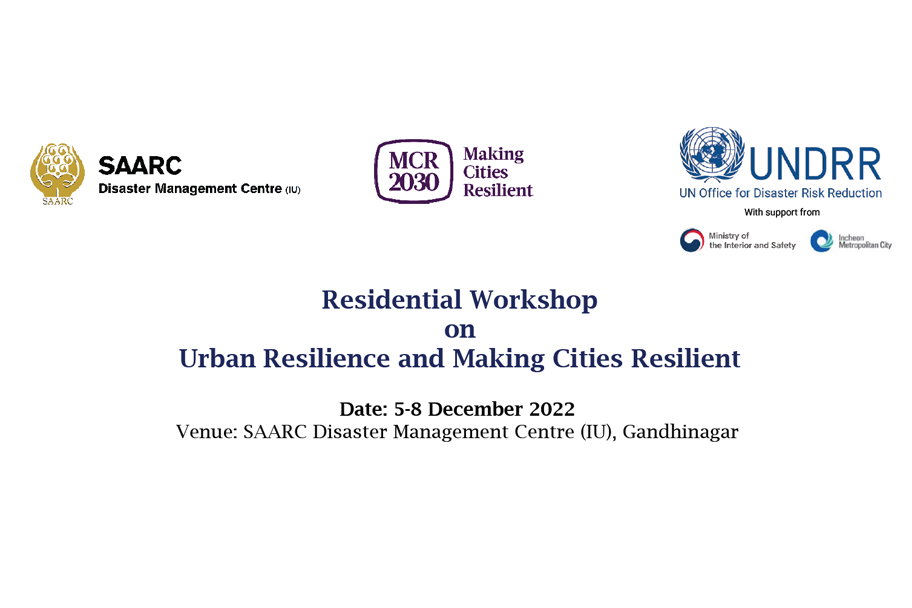Residential Workshop on Urban Resilience and Making Cities Resilient

Program Note
Background
Urbanization provides South Asian countries the potential to transform into being more sustainably resilient, liveable and prosperous. South Asia’s urban population grew by 130 million between 2001 and 2011 and is poised to rise by almost 250 million by 2030. The opportunity posed by the magnificent demographic dividend, however, remains under-leveraged due to various reasons, disasters being one of the primary ones. As per EM-DAT’s Disasters in Numbers, 2021 saw 174 disasters in Asia with India contributing 19. Disasters differentially impact urban and rural areas; while urbanisation exudes the essence of innate resilience, exposure of assets of higher value, acute and chronic vulnerabilities due to urbanization being messy and hidden, put urban areas at substantial risk.
Positively, however, urban local governments are on the ‘frontline of opportunity’ to foster transformation, reduce effect & impact of disasters, reduce chronic vulnerabilities like keeping people out of poverty and protect hard-earned local development gains, enabling urban areas, commonly acknowledged as municipalities, to become more inclusive, safe, resilient, and sustainable. Challenged by climate emergency, pandemic, and other such seen and unforeseen shocks and stresses, resilience building can no longer be a stand-alone issue and must take into consideration the inter-dependencies between sectors, the interconnectedness of socioeconomic factors, the complexity of hazards and the systemicity of disaster risk. Therefore, cities must take a long-term approach to reduce risks and must make resilience building an integral part of sustainable urban development.
Introduction to the Making Cities Resilient (MCR) Campaign
The Making Cities Resilient 2030 (MCR2030)1, a 10-year global partnership accelerating local resilience, provides a clear 3-stage Resilience Roadmap guiding cities and municipalities towards taking a long-term and continuous approach to resilience investments, from awareness raising to enhanced strategic planning and taking a whole-of-society approach to implementation. Founded on the fact that disaster prevention is an investment and not a cost, MCR2030 aims to Leave No Municipality Behind in this ambition. MCR2030 prioritizes strengthening of the local resilience agenda and the link between national and sub-national in terms of coordination, planning and implementation of resilience actions as well as across city actors. MCR2030 offers a platform for cities to access knowledge, experience, networks, tools, resources and services in support of their resilience journey to ensure cities become inclusive, safe, resilient, and sustainable by 2030, contributing directly to the achievement of Sustainable Development Goal 11 (SDG11) “Make cities and human settlements inclusive, safe, resilient and sustainable”, and other global frameworks including the Sendai Framework for Disaster Risk Reduction, the Paris Agreement, and the New Urban Agenda.
Objectives of the workshop
This workshop would serve as a fundamental training on urban disaster and climate resilience. It would aim to -
- Increase the knowledge and capacities on disaster risk reduction and climate resilience
- Introduce the Resilience Roadmap, the normative framework guiding cities towards a long-term resilience investment and other offers by MCR2030 partners
- Provide approaches and tools to further support resilience building at the local level
- Strengthen national and local government linkage and support on disaster and climate risk reduction
- Foster city-to-city exchange and learning of good practices
Course pedagogy
The training will be held in person, facilitated by trainers from UNDRR Global Education and Training Institute (GETI) and SAARC Disaster Management Centre (IU), joined by guest speakers from partner institutes. The training will include presentations, group exercises, discussions, and field visits.
| Duration | 5th to 8th December, 2022 |
| Organizer | SAARC Disaster Management Centre (IU) |
| Co-organizers | United Nations Office for Disaster Risk Reduction (UNDRR) Global Education and Training Institute (GETI) Making Cities Resilient 2030 (MCR2030) |
| Venue Country | INDIA |
| Venue City | GANDHINAGAR |
| Venue | SAARC Disaster Management Centre (IU), GIDM Campus, Behind PDPU Raisan, Village, Gandhinagar, Gujarat 382007 |
| Registration Deadline | 21/11/2022 |
| Language Of Event | English |
| Target Participants | The workshop would invite participation from the SAARC Member States of
|
| Document(s) | SDMC-Program Note |









